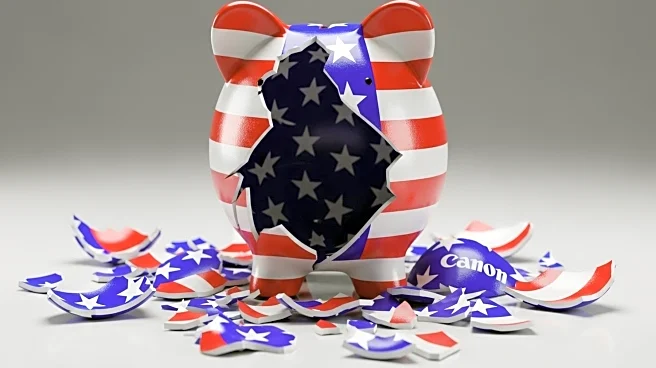What's Happening?
Tricolor Holdings, a subprime auto lender, has filed for Chapter Seven bankruptcy, leading to significant financial repercussions for major U.S. banks such as Fifth Third Bank, JPMorgan, and Barclays. The bankruptcy follows allegations of fraud and substantial losses in Tricolor's auto loan portfolio. Tricolor, which primarily serves Hispanic customers in Texas, bundled its loans into asset-backed securities, selling them to repay bank loans. The sudden bankruptcy has prompted a Justice Department investigation into potential fraud, raising concerns about the exposure of banks and investors involved in these securities.
Why It's Important?
The collapse of Tricolor Holdings highlights vulnerabilities in the financial system, reminiscent of the 2008 subprime mortgage crisis. While the scale is smaller, the situation underscores the risks associated with non-bank lenders and complex financial instruments. Major banks face potential losses, and the investigation could reveal broader issues in the subprime auto lending market. This event may lead to increased scrutiny and regulatory measures to prevent similar occurrences, impacting the financial industry and consumer lending practices.
What's Next?
The Justice Department's investigation into Tricolor's bankruptcy and fraud allegations will likely uncover more details about the extent of the financial exposure. Banks and investors involved in Tricolor's asset-backed securities are assessing their potential losses. The situation may prompt regulatory bodies to review and tighten oversight of non-bank lenders and complex financial products. Stakeholders in the financial industry are closely monitoring developments to mitigate risks and prevent a wider financial crisis.
Beyond the Headlines
The Tricolor Holdings case raises questions about the ethical and legal dimensions of subprime lending practices. It highlights the need for transparency and accountability in financial transactions involving vulnerable consumer groups. The event may lead to discussions on the role of non-bank lenders in the economy and their impact on financial stability. Long-term shifts in regulatory approaches and consumer protection measures could be triggered by this development.








